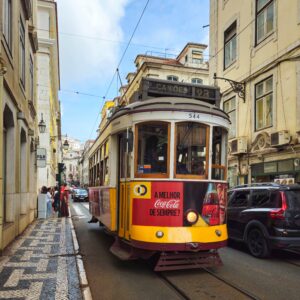Portugal

Portugal offers plenty, from historic cities to stunning coastlines and charming countryside. It perfectly combines sandy beaches, an architecturally beautiful city, many restaurants, and wine.
Portugal is a country rich in history, culture, and natural beauty. Located in southwestern Europe on the Iberian Peninsula, it offers diverse experiences, from vibrant cities and historic towns to picturesque coastal villages and wine regions.
There is so much more to see than Portugal’s capital city—the Algarve, Sintra, and Cascais, to name a few!
Keep In Mind

Portugal offers plenty, from historic cities to stunning coastlines and charming countryside. The best time to visit Portugal largely depends on your preferences for weather, crowds, and activities.
Spring (March to May)-Spring is one of the most pleasant times to visit Portugal. The weather is mild and comfortable.
Summer is the peak season, especially in coastal areas like the Algarve and cities like Lisbon and Porto. The weather is hot and dry, perfect for beachgoers and outdoor activities.
Autumn is another great time to visit as the weather remains warm and pleasant, especially in September and early October.
There are fewer tourists than in summer, which means more availability and potentially lower accommodation prices.
I found that even in the off-season, there are many people and guided tours.
Winter in Portugal is mild compared to other European countries, with temperatures ranging from 10°C to 18°C (50°F to 64°F), especially in the south. It’s the quietest time to visit, perfect for those seeking a relaxing trip. Most small stores will close early because there are not many people.
What To Expect
Language: The official language of Portugal. But you will be fine speaking English. Other languages are French and Spanish.
Currency: The currency is the Euro
Credit Cards & ATMs:
Many Portuguese shops, restaurants, and hotels accept credit cards, especially in the bigger cities tourists visit. Like many other European destinations, keeping a little cash on you is wise.
ATMs can withdraw money, pay bills, buy movie tickets, or make transfers. They can be found at most banks, airports, train stations, and shopping centers.
Plugs:
Portugal’s plugs are type F, the standard voltage is 230 V, and the standard frequency is 50 Hz. I recommend buying a universal adapter (make sure it has surge protection) and using a converter for hairdryers and hot tools.
VPN: Access to popular social media sites like Facebook and Instagram, as well as Gmail and Google Maps, is restricted in China. I recommend that you install a VPN on your devices before your trip.
Safety:
Portugal is one of Europe’s safest places to visit and the 7th safest country globally. Crime rates are low and typically occur in isolated neighbourhoods. The biggest issue is pickpocketing.
Do While In Portugal
Do greet people politely
A handshake is typical when meeting someone for the first time. A kiss on both cheeks is also usual for closer acquaintances or friends.
Do try the local food
-Portuguese cuisine is rich and diverse. Make sure to try dishes like bacalhau (salt cod), pastéis de nata (custard tarts), caldo verde (green soup), and regional specialties.
Do be punctual
-While the pace of life is relatively relaxed, being on time for meetings, dinners, and events is appreciated.
Do say” Obrigado/” (thank you)
-Showing appreciation in Portuguese will be well-received. “Obrigado” is used by men, and”Obrigado” is used by women.
Do respect personal space
-Portuguese people are friendly and pleasant but still value their personal space. Avoid getting too close during conversations.
Do enjoy the local wine
-Portugal is famous for its wine, especially port wine. Try local varieties such as Vinho Verde, Madeira, or Douro wines.
Do dress appropriately
-Portuguese people dress well, especially in cities like Lisbon and Porto. Dressing smartly and casually when dining out or visiting churches and other attractions.
Do use formal titles
-In more formal settings, it is polite to address people using their titles (e.g., Senhor/Senhora for Mr./Mrs.).
Do give tips
-While not obligatory,it’ss common to leave a 5-10% tip at restaurants if the service charge is not included A small tip is also appreciated for taxi drivers or hotel staff.
Don't
Don’t discuss politics or sensitive topics too soon. Avoid diving into controversial topics like politics, especially with people you don’t know well. Political opinions can be intense, and discussions may become heated.
Don’t expect people to speak fluent English everywhere.
-While many Portuguese people speak English, especially in tourist areas, learning a few basic Portuguese phrases is polite. It shows respect for the culture.
Don’t point at people.
-Pointing at people or things can be seen as rude. Instead, gesture with an open hand or use your chin.
Don’t rush your meals.
Meals are a social experience in Portugal and can be pretty leisurely. Please don’t rush through dinner; it’s part of the culture to take your time.
Don’t forget to respect the siesta.
-In some regions, shops or businesses may close for a few hours in the afternoon (usually from 1:00 PM to 3:00 PM) for a lunch break. Be mindful of this.
Don’t tip excessively.y
-While tipping is appreciated, giving overly generous tips may be seen as showing off or excessive. A small tip is more than enough.
Don’t engage in public displays of affection.
-While public displays of affection (PDA) are not strictly forbidden, excessive kissing or hugging in public might make locals uncomfortable.
Don’t ignore local customs or church -When visiting churches or religious sites, be respectful by dressing modestly and speaking softly. It’s also important to avoid taking photos inside certain religious buildings.
Don’t forget to watch out for pickpockets in crowded areas
-Like many popular tourist destinations, some areas in Portugalmainlyly Lisbon and Porto) can attract pickpockets. Always be vigilant with your belongings.

Portugal, the world’s largest cork producer, is celebrated for its high-quality, sustainable cork. The common cork oak trees (Quercus suber) in the Alentejo region provide the raw material for a wide range of durable and eco-friendly products, making Portugal a leader in sustainable industry.
When choosing cork products, ensuring they are authentically Portuguese is crucial.
While some may be from China and come at a lower cost, the higher price of Portuguese cork reflects its superior quality and supports the local economy.





